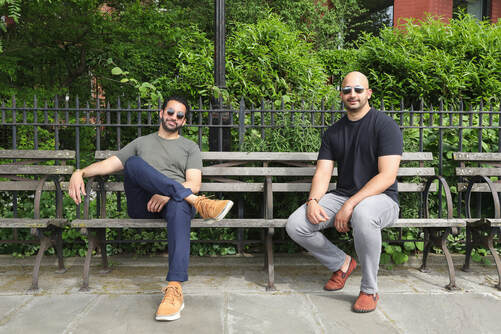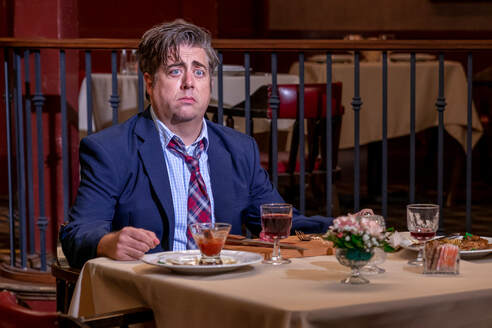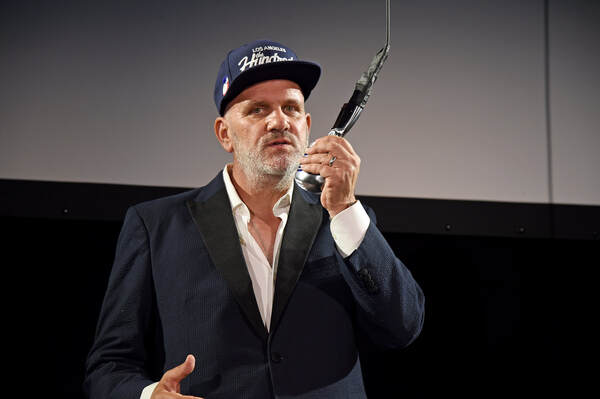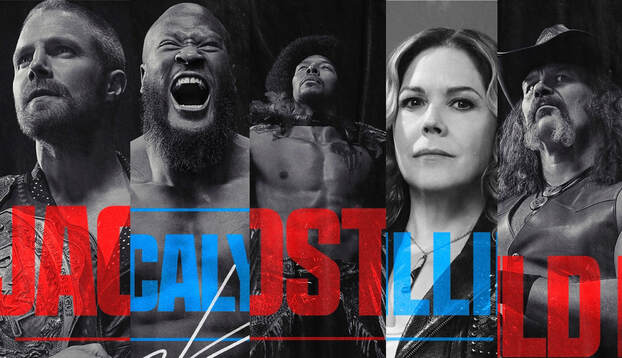Original Theme Music by Tim Girard
In today’s edition of Nerds That Speak, John takes a moment to sit down with Mike O’Malley, who is the Showrunner of the new wrestling drama, Heels, to talk about the creation and construction of this incredible series.
Powered by RedCircle
0 Comments
Original Theme Music by Tim Girard
Join John as he takes a moment to sit down with several members of the cast of ‘Heels’. Such as Stephen Amell, Mary McCormack, James Harrison, Allen Maldonaldo and Chris Bauer to talk about what attracted them to this dynamic new series and more!
Powered by RedCircle  Authors Ehsan and Shakil Ahmad Authors Ehsan and Shakil Ahmad The Ahmad brothers are a pair of science fiction authors who explored a bold new avenue in publishing their next project through Non Fungible Tokens, or NFTs, and they took a moment out of their busy schedule to discuss this ambitious approach to publishing. Nerds That Geek: What led to the creation of ‘The Wild Sun Collective’? The Ahmad Brothers: It was Matt John (@Mjdata), tech entrepreneur and cryptocurrency investor/advocate, that floated the concept to Ehsan. The initial vision was a bit narrower than the broad scope we eventually pursued. It began with reaching out to a few NFT artists for enlistment in “book as NFT” project. Fortunately, MJ was able to secure some of the top artists within in the space to commit to lead-artist roles: Robbie Trevino (characters) and Annable Siconolfi (world building). With that initial spark we gained some confidence to think and believe more theoretically about our efforts. We expanded our approach to artists spanning multiple mediums: cartographer, photographer, composer, motion capture, etc. Furthermore, we decided to memorialize the expansive effort and the take on digital publishing in a white paper that we published on Medium. The core mechanics for NFT publishing that we can discuss further are:
NTG: How did you select the art for the book? The Ahmad Brothers: The art was inspired and created by the artists based on a project brief we provided – see attached. There were no specific guard rails in terms of the artwork beyond this. We did consider specific artists in order to achieve a mixed-media and therefore, more immersive experience. NTG: What are you hoping this ambitious project accomplishes for creative individuals? The Ahmad Brothers: We wax on this quite a bit between each other. We are hoping as first movers with the first natively published NFT book series to usher in a new wave of digital publishing. As well, the NFT space is in its nascent stages and we would love to see readers become collectors in order to create a more sustainable future for artists. NTG: What are you most proud of when it comes to this project? The Ahmad Brothers: Pulling it off in such a short span of time in a digital world and culture that is relatively new to Ehsan and I. Fortunately, Matt filled in the more substantive blanks, but after just a few months I feel as though we are veterans in the space. The NFT world is revolving that quickly. We wanted our effort to be professional in order to respect all the artists’ efforts. As well, this is not a sprint. We are treating this like a long term project and feel there is much riding on it. NTG: What lies ahead for this bold new idea? The Ahmad Brothers: We have garnered a good amount of attention since launch. We are in talks with a few content platforms on potential next steps. We are considering a “Phase 2” of this based on all that we learned from our first go around. To learn more about this ambitious project and the other topics outlined above, click here.  Eric Petersen as Kevin McRoberts in ‘Kevin Can F**k Himself’. Eric Petersen as Kevin McRoberts in ‘Kevin Can F**k Himself’. Caution: This article contains minor spoilers for the season one finale of ‘Kevin Can F**k Himself’. Actor Eric Petersen plays the infamous Kevin McRoberts on the AMC Networks series, Kevin Can F**k Himself, and he took a little time out of his day to discuss his role as the heavy on this dynamic new series and the craft of acting. John Betancourt: Let’s start off by learning a little bit about what got you into acting. Eric Petersen: Well, I was always a smaller kid that got picked on a fair amount, and so I think I was always the class clown, you know, as sort of as a defense mechanism. If I can make them laugh at some joke or a bit that I'm doing, then they're not teasing me about something else, you know? So, at a very young age before I even thought of being an actor, I was definitely into physical comedy and clowning and, you know, throwing my body into lockers so that other people couldn't do it to me or something like that, you know? And so that was an early sort of impetus. And then in high school is the first time I ever tried out for a play. And I was in The Hobbit in my school, Glenburn North High School in Chicago, Illinois, and then eventually went to school for it. And it's funny because after going to college at Bradley University, I moved to New York City and did a lot of musical theater. But my initial love and dream was to do sitcoms and TV comedy. So, it's awesome that I'm getting to do that now because it was sort of always the dream. John Betancourt: So, what was it was attracted you to the role of Kevin McRoberts? Eric Petersen: Well, I think because the show had such a strong point of view, was what was really exciting to me. You know, I've done a fair amount of of multi-cam comedy. So, I understand the genre. I love the genre. I think it's an important part of the history of American television. And so, I sort of celebrate it whenever I can. And I wanted to do a show that would be a multi-cam. That was exciting for me. But the fact that then there was this whole second half of the show that had such things to say and was so smart and was really sort of deconstructing this art form that I loved. But at the same time, I don’t want to say honoring it, but maybe honoring it for lack of a better term. You know, one of the things that I talked with Valerie Armstrong, our brilliant creator, about in our very first meeting was: ”Are we making a show that is trying to destroy the sitcom?” And she was like, “No, no, no. I love multi-cam sitcom. I grew up on these shows. I love them. We're just trying to really take the air out of some of the bad parts of it.” You know, we want to make a good sitcom, but then highlight sort of some of the tropes and ideas and bits that have been used for years on other shows and show how that really affects the people that are being the butt of the joke. John Betancourt: That depth is genuinely impressive and speaking of that depth, what kind of preparatory work went into creating a character that, quite frankly is very toxic in nature. Eric Petersen: Yeah, that's fair, that’s fair. No offense taken. I think it's a combination of a lot of things. I think one of it is years of TV viewing and watching tons of multi-cam sitcoms. I think trying to sort of lean into the archetype of that buffoonish husband was always my main goal. You know, I always said that the character of Kevin McRoberts was really a combination of Ralph Kramden from The Honeymooners and Peter Griffin from Family Guy, you know, just that sort of like really, you know, blind confidence that is just so sure that everything that he's doing and saying and thinking is one hundred percent correct without any basis to really feel that way. But he just is blindly confident in himself. John Betancourt: Wow. Well, Peter Griffin is a great comparison there. Now as an actor, how do you get into the mindset of playing a character that is so oblivious yet vicious at the same time? Eric Petersen: Yeah, you know a lot of that is in the writing. You know, luckily, we have brilliant writers who – huge credit to them. Because not only were they able to write, the other half of the show, which is, this brilliant single camera, you know, I would call it the dramedy as opposed to just a drama, because I think there's a lot of comedy in the single cam as well. But just this, you know, these two characters who are truly like finding each other and finding themselves and growing, so they obviously can write that stuff. But then they also wrote, I think, a good standalone sitcom for the other half of the show. And so, a lot of it is in the writing. And, you know, one of the things that I tried to do, though, was always put as much sort of joy or positivity or sort of “lovable-ness”, I guess, into Kevin as much as I could in every instance, short of the really terrible cutting lines and even those lines, I tried to say with sort of that like goofy smile on my face that would make it not feel like he was a true just bastard… dickhead, you know? I remember one of the worst ones was in the pilot. she's cut her hand and I say, like, “You don't get to be moody, you already used that excuse once this month”, which was like a terrible thing to say. And I remember just being like, “Oh my God, I can't believe I'm saying this.” But, you know, if I was like, if I put like goofy smile on my face, then “Hey this is no big deal. This is just a thing I'm saying to my wife, you know, I'm just trying to make a little light joke.” It makes it that much more terrible because I think that when people in real life are in these situations, usually people are not like, “Well it doesn't mean you get to be moody! You already used that excuse once this month!” People aren't dastardly like that. You know, they say terrible things with a smile on their face and they think that it's not a big deal. And that's what makes it that much more heartbreaking. And I think in a way, actually kind of real. John Betancourt: That’s fair, and it really does send chills down your spine. I know I had to do a double take when I was watching the pilot because of what Kevin said. So, in staying with the actor’s mindset aspect because I love learning about the process… do you think Kevin has any idea he’s the heavy of the story? Eric Petersen: No. Zero clue. I think that's even less that he's dumb or naive. I think he just is too busy with his own thoughts to realize that he that he could possibly be the bad guy in somebody else's mind. You know, even when in the finale when Allison finally says; “You know, you think you're some everyday hero, but you're really just a dick.” I think it hits him hard, but not necessarily in a way of like, “Oh, man, I must have done something bad to really hurt my wife's feelings that she feels like she has to say this to me.” I think it's more that he's like, “What is she? Where is this coming from?” Like, he's so shocked that, like, "I can't even believe that." I think he's truly, truly shocked. And I think that, you know, if we, you know, God willing, get a get a second season, I think he'll have time to sort of maybe dive into his personal feelings about that a little bit more. But I think that really, he is completely unaware of the effect that he's having, not only on Allison, but also, I mean, he's not a great friend to Neil, you know. And he's obviously terrible to Patty. You know, he's not always nice to his dad. Sometimes he’s like; “Dad, shut up.” So, I think that he's unaware of the effect that he's having on the people around him. John Betancourt: And it does seem like he’s getting a little bit of an awakening in the finale, so I guess that kind helps a little bit, doesn’t it? Eric Petersen: Yes. Yes, because I think that that would be the most interesting thing in the long term, that we see that it does start to affect him. But I think it was important in this first season to sort of like, really establish that he is completely unaware of the world around him. John Betancourt: Absolutely. You definitely see it in the show, and you did a great job of expressing that for sure. So, one question I have that’s a bit more personal in nature. Is that, now that you’ve achieved one goal in getting into a multi-camera sitcom, what does it mean to you to have given life to a character that, quite frankly, has become so polarizing to the fans? Eric Petersen: It's been interesting, you know, because I get it. And I you know, I see that people do have very strong, strong feelings about this character. I see people that are writing like, “Oh, God, I just want to punch this guy in the face so hard!” You know, and I would be lying if I didn't say a little part of me was like, “Oh, he's just a character. I hope you don't want to punch me, Erik, in the face,” you know, and I get it. People get impassioned about viewing and stuff like that. But I think the best way to view it probably, is that if people are feeling that way, that I'm doing my job correctly, you know, and one of the things that I've actually read a few times in a few different places on Twitter and some blogs and stuff that I think is interesting, is that I've seen women writing that like, “My husband loves the sitcom stuff and then he doesn't understand the rest of the show.” And I think that that probably is happening. I think most people that are really thinking people, that are maybe a bit more woke and a little more aware of the world are seeing what the show is trying to say. But I think that there are some people who are probably viewing it and feeling like, you know, “The sitcom stuff is what's funny. I don't understand what's all this, like, sad drama stuff?” I don't think that's the majority. I think the majority of the people are aware of what the show is doing and saying. But I think that there's a message for men out there that is important because while the show clearly celebrates, female empowerment and women taking control of their stories and their lives back from the toxic men around them, and I do think that there is because of that, I think that most women watching the show will feel like, “I love this. I feel seen and heard. And this message is for me.” I think that men watching the show probably will have a moment and not that they're going to be like, “Oh my God, I'm exactly like Kevin.” But I think, you know, a lot of men will feel like, “Oh, I've done that before, where my wife's trying to talk to me, but I'm talking to my buddies and I'm just totally ignoring her.” Or “My wife wanted to go somewhere for dinner,” but I was like, “No, I want to do this instead and just sort of ignored her feelings there” or, you know, expected her to do this for me and not really giving thanks. And it's those little sort of papercuts, you know, death by a thousand paper cuts that is, I think more realistic than, you know, if Kevin had been, you know, just a really bad guy who was hitting his wife or something like that, where he's like a real asshole and like, fuck this guy. I think that he is more real. There's a lot of guys that are like that, that think that they're just lovable. Everybody loves me, everything's good, but they're unaware of the things that they're doing to the people around them. John Betancourt: So, before we wrap up, what are you most proud of when it comes to the first season of this show? Eric Petersen: I'm most proud of making a show that feels new and fresh, you know, while my part in that was sort of doing the classic part of it, and sort of highlighting maybe the past, I was so proud to be a part of a show as a whole that was really doing something new and fresh and had such a strong point of view and had such things to say. And, you know, I'm really proud of what the show is. And I think that it's starting a ton of really good, deep, important conversations in living rooms across America. And so, being a part of that was something that I was I was very, very proud of. John Betancourt: That’s awesome. Is there anything else you want to say to the fans out there? Eric Petersen: Thank you. To all the fans who've been tuning in and writing about it. And two things I'll say. Make sure that you tweet out and put on social media your support for season two. And the second thing would be – don't punch me in the face because I'm not Kevin. John Betancourt: That’s the perfect message right there. Well, Eric, I appreciate your time today, thank you so much. Eric: Thanks John. I appreciate it. |
Archives
April 2025
|
|
© 2012-2025, Nerds That Geek LLC.
All Rights Reserved. |
uWeb Hosting by FatCow




 RSS Feed
RSS Feed